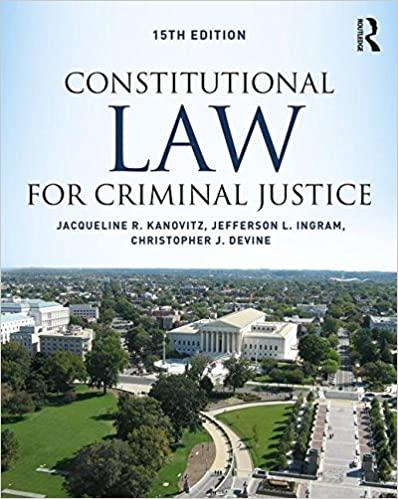Question
Question 1 2pts Once someone has been declared mentally incompetent by a court, any contractsthey later enter into are void. Group of answer choices True
Question 1
2pts
Once someone has been declared mentally incompetent by a court, any contractsthey later enter into are void.
Group of answer choices
True
False
Flag this Question
Question 2
2pts
In general, after disaffirming a contract a minor must return any consideration still in the minor's possession.
Group of answer choices
True
False
Flag this Question
Question 3
2pts
A minor may not enter into a contract.
Group of answer choices
True
False
Flag this Question
Question 4
2pts
A minor, after reaching majority, can disaffirm a contract at any time.
Group of answer choices
True
False
Flag this Question
Question 5
2pts
The contracts of a mentally impaired person are always void.
Group of answer choices
True
False
Flag this Question
Question 6
2pts
Little Dave, age 15, bought some toy drums from a music store. A week later, Little Dave got tired of playing the drums so he called the store to disaffirm.Which of the following is true?
Group of answer choices
Little Dave can disaffirm but must return the drums.
Little Dave cannot disaffirm because he has already played the drums.
Little Dave cannot disaffirm because he is a minor.
Little Dave can disaffirm and can keep the drums.
Flag this Question
Question 7
2pts
A party can disaffirm a contract based on intoxication:
Group of answer choices
A party can disaffirm a contract based on intoxication:
if both parties have been drinking.
only when one party has been drinking.
only if he or she was a minor.
Flag this Question
Question 8
2pts
An adult may disaffirm a contract:
Group of answer choices
because of their mental impairment.
if he or she enters into a contract with a minor.
if he or she enters into a contract with an intoxicated individual.
if he or she enters into a contract with an intoxicated individual.
Flag this Question
Question 9
2pts
In California the age of majority is 18.
Group of answer choices
True
False
Flag this Question
Question 10
2pts
A minor is the one most likely to argue that an item is a necessary.
Group of answer choices
True
False
Flag this Question
Question 11
2pts
A fully emancipated minor cannot disaffirm a contract.
Group of answer choices
True
False
Flag this Question
Question 12
2pts
Ratification requires a specific and detailed letter indicating acceptance of the contract.
Group of answer choices
True
False
Flag this Question
Question 13
2pts
In general, it is harder to disaffirm a contract based on mental incapacity than it is for intoxication.
Group of answer choices
True
False
Flag this Question
Question 14
2pts
The majority of states allow a minor to disaffirm a contract even if he lied about his age.
Group of answer choices
True
False
Flag this Question
Question 15
2pts
Food, clothing and shelter are always "necessaries."
Group of answer choices
True
False
Flag this Question
Question 16
2pts
If the only purpose of a contract is to restrain competition, the contract violates public policy and is illegal.
Group of answer choices
True
False
Flag this Question
Question 17
2pts
Exculpatory clauses are never enforceable.
Group of answer choices
True
False
Flag this Question
Question 18
2pts
The only time a minor can disaffirm a contract is after reaching the age of majority.
Group of answer choices
True
False
Flag this Question
Question 19
2pts
Courts generally refuse to enforce:
Group of answer choices
all of these.
contracts against public policy.
contracts that violate criminal law.
contracts that violate statutory policy.
Flag this Question
Question 20
2pts
Normally an illegal contract is:
Group of answer choices
Unenforceable
Voidable
Unconscionable
None of these.
Flag this Question
Question 21
2pts
Exculpatory clauses:
Group of answer choices
can never relieve a party from liability for any wrongdoing greater than negligence.
can relieve a party from liability for wrongdoing no matter what the reason.
are always illegal.
are always enforced because of freedom to contract.
Flag this Question
Question 22
2pts
Which of the following will increase the chances that a covenant (agreement) not to compete clause will be enforced?
Group of answer choices
the restriction is necessary to protect trade secrets.
the restriction involves a geographical area larger than the area in which the employer does business.
the covenant contains a "lifetime" restriction.
none of these, as covenants not to compete are an illegal restriction on an individual's right to work.
Step by Step Solution
There are 3 Steps involved in it
Step: 1

Get Instant Access to Expert-Tailored Solutions
See step-by-step solutions with expert insights and AI powered tools for academic success
Step: 2

Step: 3

Ace Your Homework with AI
Get the answers you need in no time with our AI-driven, step-by-step assistance
Get Started


